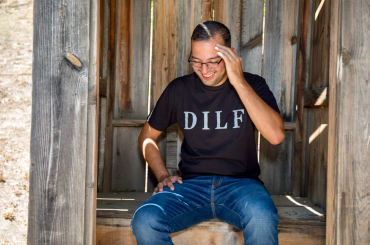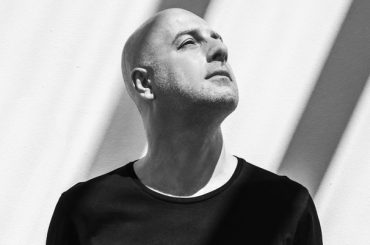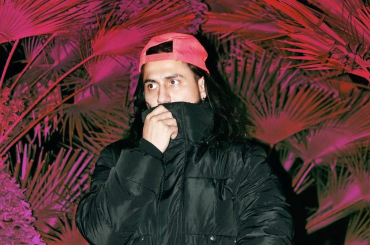It’s always interesting to take a deeper look into an artist’s humble beginnings which paint the perfect picture as to what molded them into the person they are today, in addition, to understand why and how their journey began.
While Ephwurd has been dominating festival stages and venues across the globe while his relentless sound serving as a true pioneer of the bass house genre, his journey runs much deeper than experimenting with production software.
What if I told you his father, Tim Hauser, was a founding member of the popular Grammy award winning Jazz ensemble The Manhattan Transfer which kickstarted his passion for music as a whole?
We recently caught up with bass mastermind to take a deep dive down memory lane to get a better understanding of his love for music, his introduction to electronic music, how his father played a role in his development as a musician and much more.
Check out your exclusive interview with Ephwurd below.
DJ Times: When it comes to the world of electronic dance music, many may know you as Bais Haus and Ephwurd but your passion for music runs much deeper than your average producer, your father was a founding member of the Grammy award winning Jazz ensemble The Manhattan Transfer. Tell us a little about your childhood and your introduction to music as a whole.
Ephwurd: I grew up in and out of studios and on tours with my father. I was lucky enough to be able to travel the world at a young age and see how festivals worked behind the scenes. In terms of being in studios at a young age, this was in the early days of pro tools but for the most part I was constantly surrounded by vintage hardware which was awesome. Learning what equalizers and compressors were used on what tracks during a session has come in handy to some degree. I think I was really drawn to the synths and keyboards that the studio musicians would bring into sessions. Aside from getting to sit in on sessions my father was CONSTANTLY playing records at home. He would see my interest peak with certain records then play me the whole catalog of similar artists. This ranged from The Beatles to Morton Subotnick to Cab Calloway. His knowledge of music just seemed endless. I really appreciate being raised on such an eclectic mix of music. I can definitely see how this has helped shape my views on creating music.
DJ Times: What type of music where you listening to growing up?
Ephwurd: Depends on what age. Til I was about 10 years old I would listen to whatever my parent would play. My mother was constantly playing Crosby, Stills, Nash & Young as well as Jamiroquai. My dad was just off the charts with how much music he played. When I hit my teenage years and discovered music on my own it started out pretty similar to what most kids were listening to in my school. Bands like Radiohead, Slipknot, Blink 182, whatever was popular at the moment. It wasn’t until I was about 14 that I discovered my first electronic artist Aphex Twin. From there I was enamored with anything that Warp Records released. I have the entire discography of artists such as Aphex Twin, Squarepusher, Boards of Canada, Autechre among many others. I was blown away that people could just lock themselves in a room with gear and come up with the most mental sounding stuff. IDM really struck a chord in me. After that I moved onto the more popular stuff. I fell in love with Daft Punk as every electronic music advocate does at some point, then finally discovered electro. I remember hearing Boys Noize “Oi Oi Oi” and my jaw dropped. It was just raw and hit hard. To the best of my knowledge nothing like that was around at the time. I dove into the whole electro scene and fell in love with any artist that was making that punk rock electronic sound. To this day electro still runs through my blood.
DJ Times: When did you start your deep dive into music theory?
Ephwurd: High school. We had to take music classes everyday. I went to a Waldorf school and there, the arts reign supreme. After 4 years of cycling through every music class we had from guitar, choir, recorder class (lol) and even the handbell ensemble I went to CalArts for music technology. Since college I haven’t really brushed up on my theory, but there are some things you never forget. CalArts was interesting because they have a very avant garde take on music. The music tech program let me dive into experimental sound design which let me explore different forms of theory through using technology. We would have to make these crazy patches from scratch using Reaktor 5 that would just play randomized melodies and chord progressions into whatever synths we plugged them into. None of that music was pleasant to listen to but you really get a grasp on how far you can take things.
DJ Times: You saw your father make a living as a musician, when was that moment when you realized you wanted to do the same?
Ephwurd: I don’t think I had a specific moment. I’ve always been around it so it’s what I know. If there was going to be one specific moment where I was really blown away by the power of music it must have been when I was on tour in Europe with my dad when I was about 11 years old. He played at this jazz festival for about 50,000 people. He let me come on stage and just seeing a sea of humans enjoying music together was really moving. I do think at that moment I realized how much he had accomplished and I was really inspired by that.
DJ Times: When were you first introduced to the realm of electronic dance music?
Ephwurd: This one plays into question 2. Aphex Twin will always be my Godfather. 14 year old me couldn’t handle it. First song of his I ever heard was “4”.
DJ Times: Would you say being brought up in such a musical household played a role in you becoming the melodic mastermind you are today?
Ephwurd: I think the skills I’ve developed come from a wide range of experiences throughout my life. Being brought up in a musical environment hasn’t hurt but I don’t think it would be appropriate to say that I am any kind of mastermind because of that. I think I learned to work hard through growing up with a parent in the music industry. If you’re able to sustain a 40 year career in music it’s because you bust your ass all the time and have an ungodly amount of patience. You learn to take rejection with a grain of salt and slowly you build up enough interesting ideas where people are suddenly interested in what you have to offer. If anything seeing the real side of being in the industry has helped because 90% of the time it’s hard work and the other 10% is enjoying the fruits of your labor.
DJ Times: What as through a studio session with Ephwurd.
Ephwurd: Every session starts differently. Sometimes it’s a sample that will spark the idea or a cool synth sound. There is no rhyme or reason to that. But whatever the start is you just build off of it. Usually within the first 2 hours you know if the idea is good enough to keep going on. Usually I can come up with the bones of a song in about a day. Following that is a couple days of sound design and then like 2 weeks of mixing the record so it doesn’t sound like hot trash. It’s all about sitting down with it til you have something you like. Patience is key. Now when I feel impatient I know to just close my laptop and go watch Tv or cook some food. You can’t be productive without a healthy mindset. Music has to be fun and lighthearted. Without it you will end up making garbage sounding stuff. It’s funny cause I actually make a lot of music from bed while watching TV now. For some reason that environment sparks great ideas and I can work quickly without overthinking anything. It’s a really fun way to produce. I don’t worry about how the mix sounds in those moments, it’s all about just writing out ideas and structuring the song.
DJ Times: What gear and programs do you use?
Ephwurd: My favorite question! My primary DAW is Ableton Live. I’ve been with it since version 4 (it’s on 10 now). I love Ableton for ease of use in terms of programming. The overall latency is awful so if you’re trying to play a keyboard after having 100 tracks with processing on there good luck! I think the main thing with any DAW is knowing how to effectively write without wasting any time. I know every key command on Ableton which is probably why I’ve never tried jumping over to any of the other DAWs.
For synths I actually use a wide range of stuff. Most people stick with Massive and Serum, both of which are amazing but you can get some really cool stuff by playing around with less popular synths. Ableton’s Operator for instance is a really fun tool to just mess around on. Its really simple to use and with the right FX chain you can have some insanely squelchy stuff. I am also a huge advocate of Max For Live. The possibilities are near endless with Max. Also you can’t forget about good ol analog! I have a Berhinger Neutron, Korg Monologue and a Korg Poly 800 which I am planning on modding so I can integrate it with a Max For Live plug that controls it within Ableton. The beauty of analog is that it sounds great without much processing and you get unique stuff that nobody else has. The Neutron is great for stuff like that because it’s a semi modular system. Plugging away using patch cables gives leeway to a lot of experimental noises. I have a track coming out pretty soon that was made primarily using that.
For mixing I mainly use UAD, Fabfilter and Izotope Plugins. The UAD LA-2A compressor is amazing on pretty much everything, but I mainly use it on groups.
For any aspiring producers reading this, there is no magical plugin. You can use stock Ableton plugins and still get great results. It’s all about the knowledge you obtain and how you use it. Buying plugins without knowing the fundamentals of mixing is pointless. It’s best to buy a good book on audio engineering or take a class before spending cash on anything fancy.
DJ Times: There is a certain complexity to your productions, why did you choose to go this route?
Ephwurd: I don’t really see it that way. Some songs warrant additional bits to the production to bring out the energy level. Otherwise the empty space would just sound off. I like complex high energy stuff that makes kids go wild on the dance floor but sometimes simple tracks do an even better job than the complex ones. I guess visualization also has something to do with it. When producing a song I kinda hear these frantic fills in my head and I do my best to bring those ideas to real life. Complexity is really just a matter of opinion though. I consider almost every other genre of music to be far more complex musically than dance music. But the production quality on a dance record is what really shines. I find the stereo imaging on a bass synth more complex than how many fills or complextro style lines I can write. I guess once you get into the technical side of production the definition of complexity changes a bit.
DJ Times: What is your current opinion of the current state of electronic dance music when it comes to creativity?
Ephwurd: I think a lot of stuff sounds the same. It’s the curse of every modern day producer. You come up with something cool then it gets imitated 1000 times over and the struggle begins to come up with something fresh and new. I think a lot of that has to do with accessibility. Youtube has thousands of tutorials on how to make virtually any sound and websites like Splice offer millions of samples at the click of a button. It makes writing so easy but at the same time it pools everyone together and sounds get rinsed so quickly. It kinda kills the mystery to production a bit. Still there will always be a new path that is being taken by somebody creatively and that’s truly inspiring. People get bored of what they are hearing and keep pushing the boundaries to find something new. I will always encourage new producers to stop trying to sound like something that’s already been done and try to come up with something fresh.
DJ Times: Your collaboration with Swage, “Hectic,” is hot off the presses, how did the fiery tune come together?
Ephwurd: Swage and I have been friends for about 5 years now. We actually met at Burning Man lol. We decided to hang out one day and mess around in the studio. We kicked around some ideas which eventually turned into “Hectic”. The original version started off completely different and just evolved into what it is. The whole process seemed pretty fluid. We only met up about 3 times before the song came together. The whole thing started off with the bass sound that is prevalent throughout most of the track, we just loved how hard it sounded. At first it was used for a small portion of the song but then ended up being the main element in the tune. I love linking up with friends and instead of going out to a bar or club we just sit in the studio and mess around for the night. I always feel like I’m doing something meaningful with my time and I also avoid an awful hangover the following day.
DJ Times: When it comes to Eph’d Up Radio, do you feel like there is more of a responsibility to be more of a tastemaker now that you have your own radio show compared to your traditional DJ sets?
Ephwurd: My radio show is very different from my DJ sets. The radio show has become more about showcasing up and coming music from mostly new artists. I don’t know if I’m being a tastemaker in any capacity, I just like music that is sent to me and I can now use the radio show to help new artists get heard. I do feel like I have more of a responsibility to up and comers now since I’ve taken on this mindset with the radio show. I wish I had some sort of avenue growing up where someone would take the time to listen and support my early productions. I feel like I would have gotten farther in my career at an earlier age if I had some sort of support. It’s a job to keep up with it but knowing that producers are really excited about being showcased is really a wonderful feeling and they deserve to be heard!
DJ Times: Your father popularized jazz for an entire generation and you’re considered a pioneer in the world of bass house and with electronic dance music is now what jazz was then, it’s safe to say you’re truly carrying on your father’s legacy don’t you think?
Ephwurd: I guess it could be viewed that way. My father and I differed in so many ways but we both had a mutual love for music. I am happy that before he passed away I was able to work with him on one of his records. I think carrying on music as the family business could be said but I also believe that the musical world he was involved in and the one I am involved in are vastly different. If anything I am happy to carry on the legacy of loving music and trying to bring music to other people.
DJ Times: You seem to be an artist reborn in 2019, what can we expect Ephwurd from going forward?
Ephwurd: You can expect LOTS of NEW MUSIC! I have a few collabs dropping in the coming months that I am particularly excited about. I feel like Ephwurd has been given a second chance and I am so inspired to keep delivering new stuff for everyone.


![[Exclusive] Ephwurd Takes A Trip Down Memory Lane Ephwurd](https://www.djtimes.com/wp-content/uploads/2019/02/EphwurdStudioShoot-FinalEdits-FULL_RES-0001-770x515.jpg)





